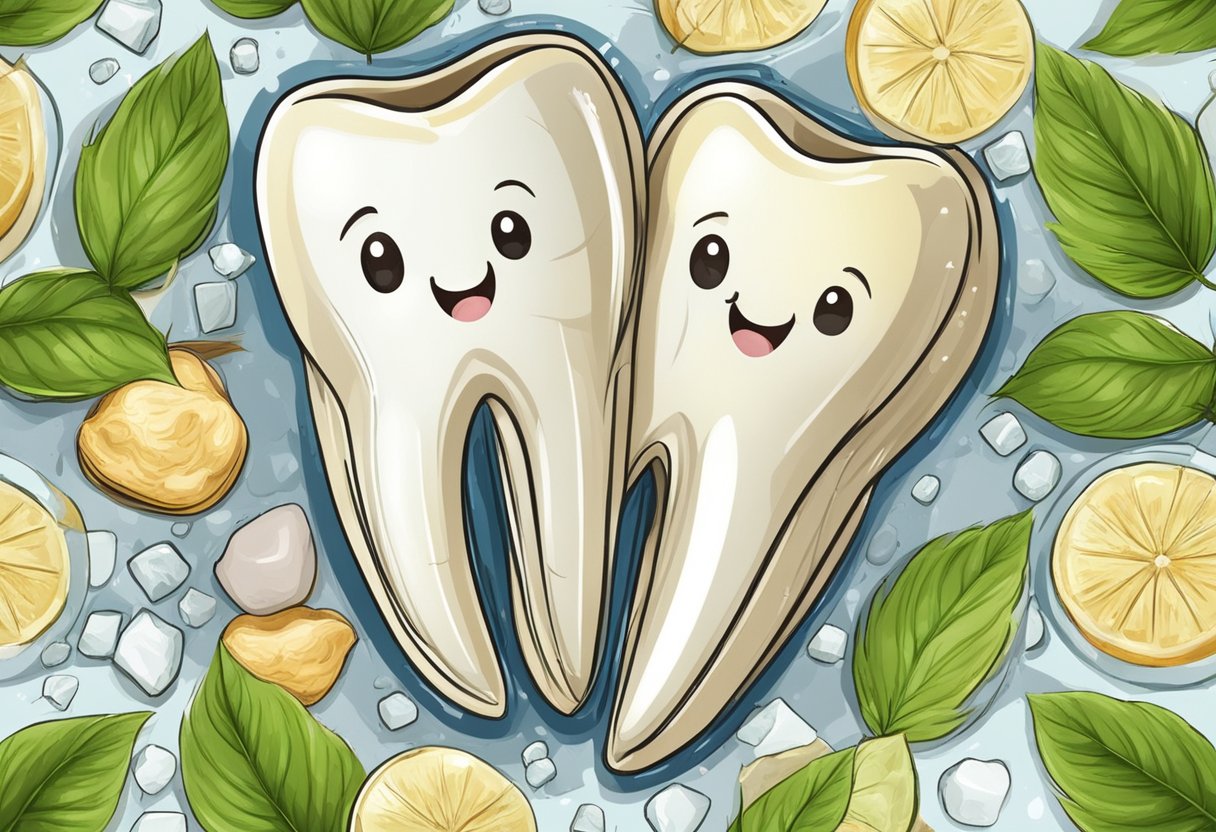Maintaining good oral hygiene is important for overall health. One of the key aspects of oral hygiene is ensuring that our teeth are strong and healthy. While brushing and flossing are important, there are other steps we can take to promote tooth health. One such step is using remineralizing tooth powder made from herbs and natural ingredients.
Disclaimer: This article is provided for informational purposes only and should not replace professional medical advice. Please consult with a qualified healthcare practitioner or herbalist before using any herbal remedies.
Remineralizing tooth powder is a natural alternative to conventional toothpaste that contains synthetic ingredients. It is made from a blend of herbs and minerals that are known to promote tooth health. The powder is designed to help remineralize teeth, which means it helps to rebuild the enamel that has been lost due to demineralization.
Using remineralizing tooth powder is a simple and effective way to promote tooth health. It can help to strengthen teeth, reduce sensitivity, and prevent cavities. In this article, we will explore the benefits and drawbacks of using remineralizing tooth powder, as well as the herbs and natural ingredients that are commonly used to make it. We will also discuss the importance of consulting with a dentist before making any changes to your oral hygiene routine.
Key Takeaways
- Remineralizing tooth powder made from herbs and natural ingredients can promote tooth health by rebuilding lost enamel.
- Using remineralizing tooth powder can help to strengthen teeth, reduce sensitivity, and prevent cavities.
- It is important to consult with a dentist before making any changes to your oral hygiene routine.
Understanding Tooth Health and Decay
Maintaining good oral health is important for overall health. Our teeth are an essential part of our body that help us to chew and digest food properly. However, our teeth are also susceptible to decay and damage that can lead to pain, infection, and tooth loss.
Tooth decay is caused by bacteria that produce acid that erodes the enamel, the hard outer layer of our teeth. When the enamel is weakened, it can lead to cavities or holes in our teeth. Plaque, a sticky film of bacteria that forms on our teeth, can also contribute to tooth decay and gum inflammation.
It is important to maintain a healthy balance of bacteria in our mouth. Our oral microbiome, the collection of microorganisms that live in our mouth, plays a crucial role in maintaining dental health. A healthy microbiome can help to prevent tooth decay and gum disease.
Tooth enamel is the hardest substance in our body and protects our teeth from damage. However, enamel can be weakened by acid erosion from bacteria or acidic foods and drinks. Remineralizing tooth powder, made from natural herbs and minerals, can help to strengthen enamel and promote healthy teeth.
In summary, understanding tooth health and decay is crucial for maintaining good dental health. By promoting a healthy oral microbiome, avoiding acidic foods and drinks, and using natural remineralizing tooth powder, we can help to prevent tooth decay and promote healthy teeth and gums.
The Role of Diet and Lifestyle in Tooth Health
Maintaining good oral health is not just about brushing and flossing regularly. Our diet and lifestyle choices also play an important role in keeping our teeth healthy.

One of the biggest culprits of tooth decay is sugar. Consuming sugary foods and drinks can lead to the production of acid in the mouth, which can erode tooth enamel and lead to cavities. To reduce the risk of tooth decay, it is important to eat less sugar and limit our intake of sugary treats and drinks.
Starchy foods like bread, pasta, and potatoes can also contribute to tooth decay. These foods break down into simple sugars in the mouth, which can then be used by bacteria to produce acid. To reduce the risk of tooth decay, it is important to limit our intake of starchy foods and focus on eating more fruits and vegetables.
Fruits and Vegetables
Fruits and vegetables are not only good for our overall health, but they are also beneficial for our teeth. They are rich in vitamins and minerals, including calcium and magnesium, which are essential for healthy teeth and bones.
Teas
Tea is another good choice for promoting tooth health. Some types of tea, such as green tea, have been shown to have antibacterial properties that can help prevent tooth decay.
Grains and nuts are also good choices for promoting tooth health. Whole grains are rich in fiber, which can help scrub away plaque and food particles from teeth. Nuts are a good source of healthy fats, which can help reduce inflammation in the mouth and promote healthy teeth and gums.
Organic fruits, grass-fed meat, and raw milk are also good choices for promoting tooth health. These foods are rich in nutrients and free from harmful chemicals and additives that can contribute to tooth decay.
Supplements
Finally, supplements can also be beneficial for promoting tooth health. Some supplements, such as calcium and vitamin D, can help strengthen teeth and bones. Other supplements, such as probiotics, can help promote a healthy balance of bacteria in the mouth and prevent tooth decay.
Overall, maintaining good oral health requires a combination of good oral hygiene habits and a healthy diet and lifestyle. By making smart choices about what we eat and how we live, we can help ensure that our teeth stay healthy and strong for years to come.
Oral Hygiene Practices for Healthy Teeth
Maintaining good oral hygiene practices is essential for healthy teeth and gums. Brushing and flossing daily are the most basic practices that we should follow to keep our teeth and gums healthy. Brushing our teeth twice a day with fluoride toothpaste is the most effective way to remove plaque and prevent cavities.
Using natural toothpaste can also be a good option for those who want to avoid chemicals in their oral care products. There are many natural toothpastes available that contain herbs and other natural ingredients that can help remineralize teeth and freshen breath. Some of the popular natural toothpaste ingredients include baking soda, coconut oil, and neem oil.
In addition to brushing and flossing, drinking plenty of water and avoiding sugary drinks like soda can also help prevent cavities and gum disease. Water helps to wash away food particles and bacteria from our mouth, while sugary drinks can increase the acidity in our mouth, leading to tooth decay and bad breath.
Gum disease is a common problem that can lead to tooth loss if left untreated. To prevent gum disease, it’s important to maintain good oral hygiene practices and visit the dentist regularly. Some of the symptoms of gum disease include red, swollen, or bleeding gums, bad breath, and loose teeth.
In summary, practicing good oral hygiene habits is essential for healthy teeth and gums. Brushing and flossing daily with fluoride toothpaste, using natural toothpaste, drinking plenty of water, and avoiding sugary drinks can all help prevent cavities, gum disease, and bad breath.
Understanding Remineralization and Demineralization
As we know, dental caries is a common problem that affects many people worldwide. It is caused by the imbalance between demineralization and remineralization cycles in the teeth. Demineralization is the process by which minerals such as calcium and phosphate are lost from the enamel, leading to the formation of carious lesions. On the other hand, remineralization is the process by which these minerals are redeposited on the enamel, reversing the effects of demineralization.
Tooth remineralization can occur naturally through saliva, which contains minerals such as calcium and phosphate. However, sometimes this process may not be sufficient to repair the damage caused by demineralization. This is where remineralizing agents come into play. These agents help to enhance the process of remineralization, leading to the repair of damaged enamel.
One such agent is calcium carbonate, which is commonly found in toothpaste and other dental products. Calcium carbonate helps to neutralize acids in the mouth, which can lead to demineralization. It also provides a source of calcium ions, which are essential for the remineralization of enamel.
Hydroxyapatite
Another important mineral for tooth remineralization is hydroxyapatite. Hydroxyapatite is the main mineral component of teeth and bones and is responsible for their strength and durability. It is also a key component of many remineralizing agents and can be used to repair damaged enamel.
Herbal Remedies
In addition to these minerals, there are also many herbal remedies that can help with tooth remineralization. For example, some studies have shown that green tea extract can help to prevent demineralization and promote remineralization in the teeth. Other herbs such as neem, licorice, and clove have also been shown to have antibacterial properties, which can help to prevent the formation of carious lesions.
It is important to note that remineralizing agents are not a substitute for proper dental hygiene and regular visits to the dentist. They are simply a way to enhance the natural process of tooth remineralization and repair damage caused by demineralization. In some cases, fillings or other dental procedures may be necessary to repair more severe damage.
Overall, understanding the process of remineralization and demineralization is essential for maintaining good dental health. By using remineralizing agents and practicing proper dental hygiene, we can help to prevent the formation of carious lesions and keep our teeth healthy and strong.
Herbs and Natural Ingredients for Tooth Health
We believe that natural ingredients can be an effective way to promote tooth health, and one such ingredient that has been gaining popularity is herbs. Many herbs have been used in traditional medicine for centuries and are now being incorporated into modern dental care products.
Bentonite Clay
One popular natural ingredient in toothpaste is bentonite clay. This clay is known for its ability to bind to toxins and help remove them from the body. When used in toothpaste, it can help to remove stains and toxins from the teeth, leaving them feeling cleaner and healthier.
Baking Soda
Another popular ingredient is baking soda. This ingredient has been used for years as a natural tooth whitener and cleaner. It is also known for its ability to neutralize acids in the mouth, which can help to prevent tooth decay.
Cinnamon
Cinnamon is another herb that has been used in dental care for its antibacterial properties. It can help to fight off harmful bacteria in the mouth, which can lead to tooth decay and gum disease.
Mint
Mint is also commonly used in toothpaste and mouthwash. Its refreshing taste and scent can help to freshen breath, while its antibacterial properties can help to fight off harmful bacteria in the mouth.
Essential Oils
Essential oils, such as peppermint and tea tree oil, are also popular in dental care products. Peppermint essential oil can help to freshen breath and fight off harmful bacteria, while tea tree oil has been shown to have antibacterial and anti-inflammatory properties.
Activated Charcoal

Activated charcoal has gained popularity in recent years as a natural teeth whitener. It works by absorbing stains and toxins from the teeth, leaving them looking brighter and healthier.
Coconut Oil
Coconut oil is another natural ingredient that has been gaining popularity in dental care. It has antibacterial and anti-inflammatory properties, and can help to promote healthy gums.
Xylitol
Xylitol is a natural sweetener that is often used in toothpaste and chewing gum. It has been shown to help prevent tooth decay by reducing the amount of harmful bacteria in the mouth.
Silica
Silica is a natural mineral that is often used in toothpaste as an abrasive. It can help to remove stains and plaque from the teeth, leaving them feeling cleaner and healthier.
Overall, we believe that incorporating natural ingredients into dental care products can be an effective way to promote tooth health. When used in combination with proper oral hygiene practices, these ingredients can help to keep your teeth and gums healthy and strong.
The Use of Remineralizing Tooth Powder
At present, remineralizing tooth powder is gaining popularity as a natural and effective solution for maintaining healthy teeth. It is a powdered mixture of various herbs and minerals that are known for their remineralizing properties.
Tooth powder, in general, is a great alternative to conventional toothpaste as it does not contain any harmful chemicals, preservatives, or artificial sweeteners. It is also more eco-friendly as it does not come in plastic packaging.
Homemade tooth powder is easy to make and can be customized according to individual preferences. A basic remineralizing tooth powder recipe may include ingredients such as calcium carbonate, bentonite clay, baking soda, and essential oils such as peppermint or tea tree oil.
The use of remineralizing tooth powder can help strengthen tooth enamel, prevent tooth decay, and promote overall oral health. It works by providing the necessary minerals to the teeth that may have been lost due to demineralization caused by acidic foods and drinks.
It is important to note that while remineralizing tooth powder can be a great addition to one’s oral care routine, it should not be used as a substitute for professional dental care. Regular dental check-ups and cleanings are still necessary to maintain optimal oral health.
In conclusion, remineralizing tooth powder can be a safe and effective option for those looking for a natural alternative to conventional toothpaste. With its various benefits, it is definitely worth considering adding to your oral care routine.
Potential Benefits and Drawbacks of Remineralizing Tooth Powder
Remineralizing tooth powder is a natural and effective way to promote tooth health and prevent tooth decay. However, like any product, it has its potential benefits and drawbacks. In this section, we will discuss both to help you make an informed decision.
Potential Benefits
Remineralization of Teeth
Remineralizing tooth powder contains ingredients that promote the remineralization of teeth. This means that it helps to restore lost minerals in the enamel, making the teeth stronger and more resistant to decay. Some of the common ingredients in remineralizing tooth powders include calcium, magnesium, and silica.
Reducing Tooth Sensitivity
Remineralizing tooth powder can help reduce tooth sensitivity. It contains ingredients that help to strengthen the enamel and reduce the exposure of the underlying dentin. This can help reduce the pain associated with sensitive teeth.
Removing Stains
Remineralizing tooth powder can help remove surface stains on the teeth. It contains ingredients that help to gently polish the teeth, removing surface stains and leaving them looking brighter and whiter.
Promoting Good Bacteria
Remineralizing tooth powder can help promote good bacteria in the mouth. It contains ingredients that help to create an environment that is conducive to the growth of beneficial bacteria. This can help to prevent the growth of harmful bacteria that can cause tooth decay and gum disease.
Alkalizing the Mouth

Remineralizing tooth powder can help to alkalize the mouth. It contains ingredients that help to neutralize acid in the mouth, creating an environment that is less conducive to the growth of harmful bacteria. This can help to prevent tooth decay and gum disease.
Potential Drawbacks
Dry Mouth
Remineralizing tooth powder can be drying to the mouth. This is because it contains ingredients that absorb moisture. If you already suffer from dry mouth, using remineralizing tooth powder may exacerbate the problem.
pH Imbalance
Remineralizing tooth powder can cause a pH imbalance in the mouth. This is because it contains alkaline ingredients that can raise the pH of the mouth. While this can be beneficial in small doses, excessive use can lead to an imbalance that can harm the teeth and gums.
Circulation Issues
Remineralizing tooth powder can cause circulation issues if it is ingested. This is because some of the ingredients in the powder can be absorbed into the bloodstream and cause issues with circulation.
Antimicrobial Effects
Remineralizing tooth powder can have antimicrobial effects. While this can be beneficial in preventing tooth decay and gum disease, excessive use can lead to the development of antibiotic-resistant bacteria.
In conclusion, remineralizing tooth powder can be an effective way to promote tooth health and prevent tooth decay. However, it is important to be aware of its potential benefits and drawbacks to make an informed decision. If you have any concerns, it is always best to consult with your dentist before using any new dental products.
Consulting with a Dentist
When it comes to dental health, consulting with a dentist is always a good idea. Dentists can provide valuable insight into the specific needs of your teeth and gums, and can offer recommendations for maintaining optimal oral health.
If you are interested in using herbs for tooth health, it is especially important to consult with a dentist. While herbs can be beneficial for promoting tooth remineralization and overall oral health, it is important to use them safely and effectively. A dentist can help you determine which herbs are best for your individual needs and can provide guidance on proper usage and dosage.
Additionally, dentists are often involved in dental research and can provide valuable information on the latest research findings related to herbs for tooth health. By staying up-to-date on the latest research, dentists can offer evidence-based recommendations for promoting optimal oral health through the use of herbs.
Overall, consulting with a dentist is an important step in promoting optimal oral health and using herbs safely and effectively. We encourage anyone interested in using herbs for tooth health to schedule a consultation with a dentist to discuss their individual needs and goals.
Frequently Asked Questions
What are some natural ingredients in tooth powder that promote remineralization?
Remineralizing tooth powder typically contains natural ingredients such as nano-hydroxyapatite, potassium nitrate, sodium monofluorophosphate, and antioxidants. These ingredients have been shown to help strengthen tooth enamel and promote remineralization, which can help prevent tooth decay and other dental problems.
Are there any scientific studies supporting the effectiveness of remineralizing tooth powder?
Yes, there have been several scientific studies that support the effectiveness of remineralizing tooth powder. For example, a study published in the Journal of Clinical and Experimental Dentistry found that toothpaste containing nano-hydroxyapatite was effective in remineralizing tooth enamel and reducing dental hypersensitivity. Another study published in the Journal of Indian Society of Pedodontics and Preventive Dentistry found that a toothpaste containing herbal extracts was effective in promoting remineralization and preventing dental caries.
What are some benefits of using remineralizing tooth powder?
Using remineralizing tooth powder can provide several benefits for your dental health. Some of the most notable benefits include strengthening tooth enamel, preventing tooth decay, reducing dental hypersensitivity, and promoting overall oral health.
Can remineralizing tooth powder help with tooth sensitivity?
Yes, remineralizing tooth powder can be effective in reducing tooth sensitivity. This is because the natural ingredients in the tooth powder work to strengthen tooth enamel and reduce the exposure of sensitive nerve endings.
Are there any potential side effects of using remineralizing tooth powder?
Remineralizing tooth powder is generally considered safe for use, and there are no known side effects associated with its use. However, it is important to use the tooth powder as directed and to consult with your dentist if you experience any unusual symptoms or discomfort.
What is the recommended usage of remineralizing tooth powder?
The recommended usage of remineralizing tooth powder can vary depending on the specific product and the manufacturer’s instructions. However, in general, it is recommended to use the tooth powder at least twice a day, in place of regular toothpaste. Be sure to follow the instructions provided with the product and consult with your dentist if you have any questions or concerns.





